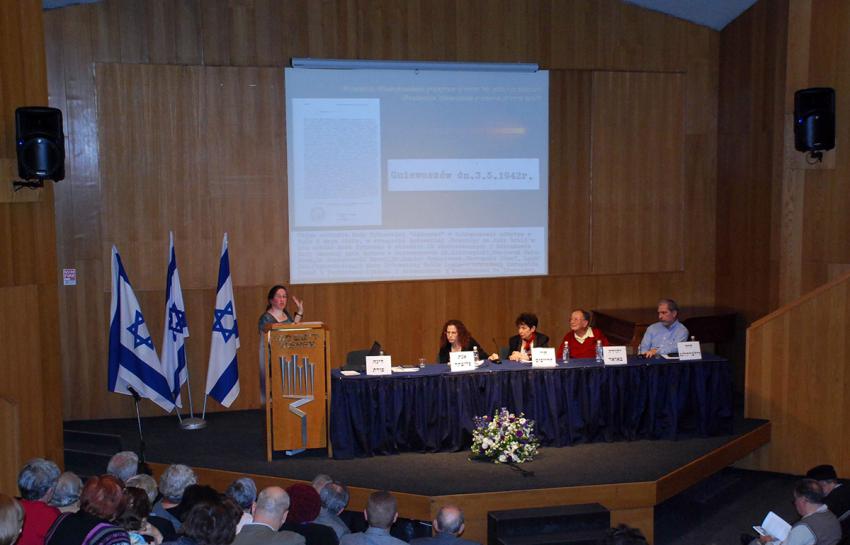
Prof. Havi Dreifuss speaking at a symposium marking the launch of her book 'We Polish Jews?', Yad Vashem, January 2010
The recent amendment passed by the Polish parliament and approved by the Polish president to Poland's National Institute of Remembrance Law, constitutes a major blow to Holocaust research and remembrance. The original law was first enacted with a view to promote research and documentation of crimes that were committed in and against Poland by Nazi Germany and Soviet Russia, from the outbreak of WWII (1 September 1939) until the end of Soviet rule in Poland (December 1989). The current addendum, however, is rooted in the significant and distressing changes taking place in Poland in relation to the patterns of Holocaust remembrance and commemoration. The problematic amendment criminalizes any public statement that, “contrary to historical facts,” refers to responsibility or partial responsibility of the Polish nation or the Polish State for crimes committed during the Holocaust.
No doubt, Poland was subjected to a draconian German occupation regime during the war. The extermination camps that were built on Polish soil were unquestionably established and operated by Nazi Germany, and not by any Polish authority. It bears emphasizing that as early as 2006 Yad Vashem took action alongside the Polish authorities to ensure that the name of the Auschwitz-Birkenau camp as officially registered in UNESCO documents states specifically and unequivocally that it was a German concentration and death camp. Yet it is equally indisputable that apart from German genocidal policy against the Jews, there were instances where Poles, from all walks of life, were accomplices to the murder and persecution of Jews. Blackmailers (szmalcowniki); murders of Jews by average citizens, members of the Polish underground and the Polish police; the murder of the Jews of the town of Jedwabne by their non-Jewish neighbors; and the post-war (1946) Kielce Pogrom are all important and well-documented parts of the history of the Holocaust in Poland. Along with remarkable cases of noble sacrifice by Poles who were recognized as Righteous Among the Nations by Yad Vashem on behalf of the Jewish people, there were also cases of betrayal and murder of Jews by Poles.
The present amendment aims to "revise" history, while censoring broad swathes of it through legislation. This constitutes a clear and dangerous attempt to intimidate educators, guides on trips to Poland, journalists and politicians, and to prevent them from relating freely to these important parts of Polish and Jewish history during the Holocaust. The new amendment's technical exemption of researchers and artists from punishment is in no way reassuring, not only because lectures to the public, opinion pieces and the like are liable to be interpreted by the authorities as deviating from the framework of legitimate academic endeavor. This creation of a menacing public atmosphere will mean that students and researchers, particularly in Poland with its notable scholarly community, will be afraid to explore and discuss documentation openly and in depth, and to write groundbreaking studies in the field. The appropriate avenue for combatting distorted representations of history must not be through criminalizing problematic and even false declarations, but rather by encouraging research and strengthening appropriate educational and informational activities.
During the thirty years since the end of Communist rule in Poland, Poland has contributed tremendously to Holocaust research and documentation. Polish researchers have been at the forefront of analyzing the complex and difficult reality in which Jews and Poles found themselves under the Nazi regime, and consistently extending the world of knowledge in this field. Their research, as well as the publications of members of the international community of researchers, presents a complex and dismal picture of the fate of Polish Jewry during the Holocaust. This fate stemmed primarily from the murderous ideology of Nazi Germany and the ways in which the Nazis chose to implement their ideology, but it was also shaped by the reality that evolved in occupied Poland, of which Poles were a part.
In light of the fruitful and long-standing cooperation between Polish and Israeli institutions, spearheaded by Yad Vashem, in education, research, culture and commemoration, and based upon our deep appreciation of our Polish colleagues, Yad Vashem can only hope that the Constitutional Court of Poland, to which the current law has been referred for reconsideration, will fundamentally change its wording. Poland is an important part of the Western academic and cultural community, and as such, Yad Vashem calls upon its government to support Poland's commitment to the freedom of research, publications and public debate.
